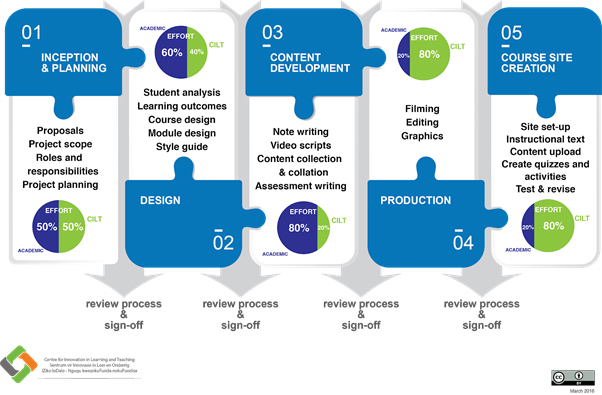From 2015 – 2018 there was a university supported project to develop massive open online courses where academics responded to a call for proposals. UCT had formal agreements with Coursera and FutureLearn which allowed UCT to host courses on either of those platforms. Under the university sponsored programme, 15 MOOCs were created and thereafter additional MOOCs have been created by UCT academics with independent funding - the UCTMOOCs enrol thousands of participants every year.
The original MOOCs project was set up by the university with the following goals:
To showcase the teaching and research excellence of UCT
To give exposure to African content and knowledge
To profile key postgraduate programmes and research areas aligned with the university’s strategic goals
To support students in academic transitions
To make UCT’s knowledge resources globally accessible
To develop models and expertise in online learning that could be deployed in mainstream degree programmes
CILT is responsible for managing the UCT MOOC portfolio on Coursera. There is no longer university funding available to support making free open online courses, but if you're interested in exploring the possibility of creating a MOOC, with your own funding, please contact Janet Small for information about the process or submit your CILT Course Development Request.
Proposing a MOOC
UCT affiliated units or departments can put forward a proposal to develop a UCT branded MOOC provided that they meet certain criteria. They will need to have raised sufficient funds to support the development and maintenance of the MOOC, and they need approval of their Head of Department and the Dean of the Faculty to proceed. The proposal also needs to be tabled at the Online Education Subcommittee before being finally accepted. MOOCs can be hosted on Coursera or other platforms with which UCT has an agreement.
The MOOC development process
In creating a MOOC course, most time is invested during the design and content development stages. Here one needs to be clear on the purpose and how the course will be used once created. MOOCs, being self-paced, open enrolment and hosted on an international platform, rely on ‘volunteer’ learners, with little time and multiple competing demands, so the course needs to be able to capture the essence of your topic, and be highly appealing to maintain interest. Most learners will drop-out but many will still find value in aspects that interest them.

Consider your resources and time
Creating a high quality MOOC is a large investment of time and money and so it is important for a course to be durable avoid the core course content becoming outdated or requiring frequent updating, meeting multiple needs (e.g., to showcase or profile your unit, recruit students, disseminate research, as a bridging course for postgraduate programmes or other uses) and serving different audiences (e.g., working professionals, students, policy makers, researchers).
The nature of a public open course
As it is a public open course, there are some restrictions on the use of learning materials because of copyright, so it is not possible or even desirable to rely on the scholarly publications that are only available behind a journal paywall. This means that you may need to pitch it as an introductory level course or otherwise produce your own in-depth content. In preparation, curate publicly accessible material that already exists, and consider what bespoke material you will need to create for your course.
What’s unique about MOOCs
There are now thousands of open online courses created by universities across the world – do some searches on your topic and related fields to get an idea of what already exists, what you like about them (or not) and how your course will offer something different. The aggregator site Class Central is a good starting point for searches.
